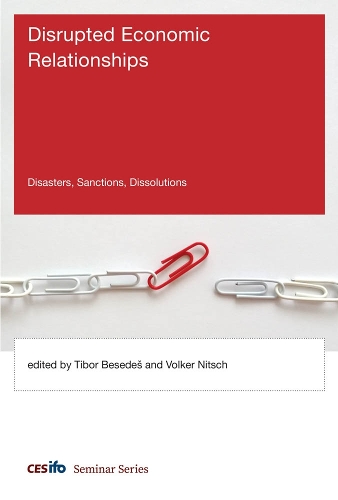
Disrupted Economic Relationships: Disasters, Sanctions, Dissolutions
(Hardback)
Publishing Details
Disrupted Economic Relationships: Disasters, Sanctions, Dissolutions
By (Author) Tibor Besede
Edited by Volker Nitsch
Contributions by Tibor Besede
Contributions by Volker Nitsch
Contributions by Enrico Spolaore
Contributions by Romain Wacziarg
Contributions by Arthur Silve
Contributions by Thierry Verdier
Contributions by Julian Hinz
Contributions by Tristan Kohl
MIT Press Ltd
MIT Press
7th May 2019
United States
Classifications
Professional and Scholarly
Non Fiction
330
Physical Properties
Hardback
304
Width 152mm, Height 229mm, Spine 25mm
Description
Empirical studies and theoretical analyses examine the causes and consequences of disruptions in cross-border economic relationships, including political conflict, economic sanctions, and institutional collapse.Cross-border economic relationships gradually strengthened in the decades after World War II; for most of the postwar period, international trade and investment have grown faster than output, a process often termed "globalization." In recent years, however, economic relationships have grown more fragile, subject to disruption by such factors as political conflict, economic sanctions, and the dissolution of institutional arrangements. This timely CESifo volume offers empirical studies and theoretical analyses that examine the causes and consequences of these disrupted economic relationships. Contributors propose a new theoretical framework for understanding the economic impact of intergroup conflict and develop a predictive model to analyze the contagion of regional wars. They offer empirical studies of the economic effect of targeted sanctions and boycotts, including those imposed upon Iran, Russia, and Myanmar; argue provocatively that natural disasters are associated with increased international trade; analyze trade duration, finding previously identified explanatory factors to be insufficient for explaining variations in trade survival over time; and critically review the hypothesis that oil was a crucial factor in the collapse of the Soviet Union. Contributors Daniel P. Ahn, Tibor Besedes, Kilian Heilmann, Wolfgang Hess, Julian Hinz, Melise Jaud, Tristan Kohl, Madina Kukenova, Chenmei Li, Rodney D. Ludema, Volker Nitsch, Maria Persson, Chiel Klein Reesink, Arthur Silve, Enrico Spolaore, Martin Strieborny, Marvin Suesse, Peter A. G. van Bergeijk, Thierry Verdier, Romain Wacziarg
Author Bio
Tibor Besedes is Associate Professor in the School of Economics at Georgia Institute of Technology. Volker Nitsch is Professor for International Economics at Darmstadt University of Technology. Tibor Besedes is Associate Professor in the School of Economics at Georgia Institute of Technology. Volker Nitsch is Professor for International Economics at Darmstadt University of Technology. Enrico Spolaore is is Professor of Economics at Tufts University. Dr. Daniel P. Ahn is Professorial Lecturer at Johns Hopkins School of Advanced International Studies and a consultant for the U.S. government. He previously led the Office of the Chief Economist at the U.S. Department of State and was Chief Commodities Economist at Citibank.
